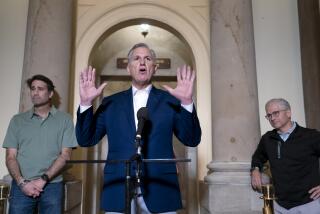Obama ends meeting after GOP proposes short-term debt-ceiling fix
- Share via
President Obama abruptly left debt negotiations with congressional leaders Wednesday after a top Republican said there was no longer time to engage in the large-scale deficit-reduction discussions the White House seeks as part of a vote to raise the nation’s debt ceiling.
Rep. Eric Cantor (R-Va.), the House majority leader, told the president instead that Congress should consider a series of debt-ceiling votes based on the first series of spending cuts that have been identified. Talks could continue to identify additional cuts for subsequent votes, he proposed. Republicans have refused Democrats’ call for taxes on the wealthy.
The president responded by ending the meeting, sources said. Aides described it as the most tense meeting yet in the months of discussions, with the president at one point accusing both sides of “posturing.”
“I suggested we were so far apart I didn’t see in the time before us how we get to where he wants us to be,” Cantor told reporters after the nearly two-hour session.
Cantor said the president “walked out,” but a Democratic official familiar with the meeting disputed that account, adding that Cantor had repeatedly interrupted Obama to press his short-term proposal.
“Left abruptly is perfectly fair,” the official said. “But the meeting was over -- in no sense did he walk out on it.’’
The president then challenged Cantor not to set such an ultimatum on a debt-ceiling vote and, according to a congressional aide, said he wouldn’t be afraid to veto any such legislation.
“The president told me, ‘Eric, don’t call my bluff. I’m going to take this to the American people,’ ” Cantor said.
During the White House meeting, the financial firm Moody’s issued a warning that it was putting the U.S. credit rating on watch for possible downgrade, which could set off a firestorm in the financial markets if Congress does not act to raise the debt ceiling by Aug.2.
Republicans first demanded steep spending cuts in exchange for their votes, but Obama is seeking a larger and more balanced deficit-reduction plan that would require both spending cuts and tax revenue, which the GOP has rejected.
“Nothing was agreed to,” said the Democratic official, who described the meeting as “definitely more contentious – partly because you’re getting down to specifics. And the specifics are hard.’’
Toward the end of the meeting, before he left, the president said, “This process is confirming what the American people think is the worst about Washington -- that everyone is more interested in posturing, political position and protecting their base than solving real problems.”
The president also “was most insistent that he wanted the debt limit extended into 2013, because he believes a repeat of what we’re going through now, when things will be politically more tense, would be very destabilizing,” the official said.
Obama said at the meeting that House Republicans would need to either compromise on their hard-line stance opposing any revenue generators in the agreement or drop their insistence that a limit in the debt ceiling be matched dollar for dollar by spending cuts, the official said.
But Obama indicated that it was still possible for negotiators to reach $2 trillion in savings, “but that can only happen if the spirit changes to why we can’t do things to why we can.”
The talks will resume Thursday.
More to Read
Sign up for Essential California
The most important California stories and recommendations in your inbox every morning.
You may occasionally receive promotional content from the Los Angeles Times.












